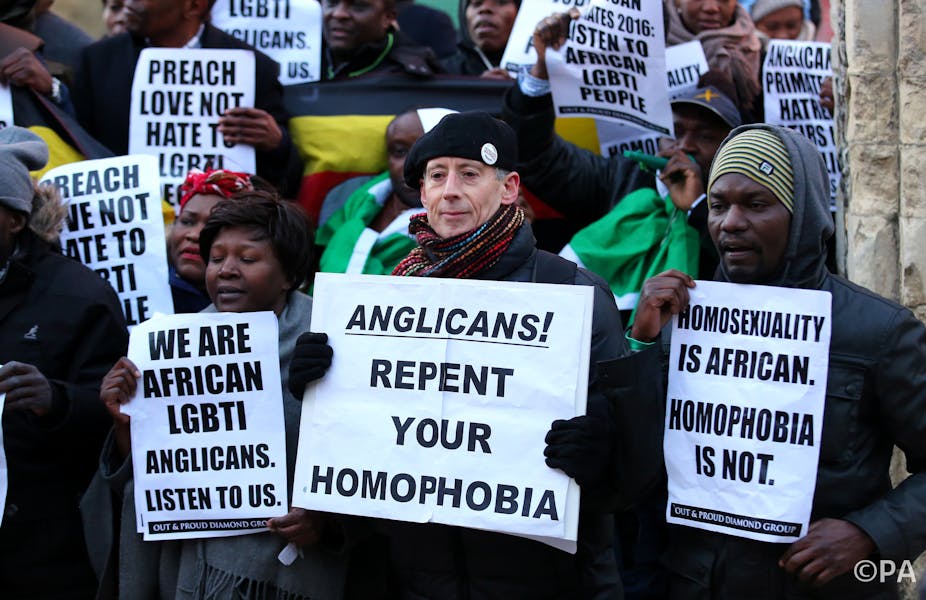The recent decision by the leaders of the worldwide Anglican church to punish its US branch for recognising gay marriage has, understandably, led many to feel the church is taking an anti-LGBT stance. But there is a silver lining in this story.
At their recent meeting, the Anglican church leaders did indeed decide to suspend the episcopal church for its “fundamental departure” from the faith. It’s also true that the decision has come as a result of pressure from more conservative church leaders – not at least those from a range of African countries.
But one part of the official statement that came out of this meeting has gone largely unnoticed – and that’s the section in which the church leaders “reaffirmed their rejection of criminal sanctions against same-sex attracted people”.
This statement is surprising. Many of the leaders come from countries in which same-sex practices are illegal – particularly those who sought sanctions on the US church. Gay men and women face being ostracised and even imprisoned in countries such as Uganda, Burundi, Nigeria and Rwanda – all of which were represented at the meeting.
The Anglican churches in Uganda and Nigeria have even supported introducing new, fiercer anti-homosexual legislation in their countries.
They could do so without facing any “consequences” for their role in the Anglican Communion, while the US church is now being sanctioned for its support for, and blessing of, loving relationships between people of the same sex.
The inclusion of this statement may very well testify to the extraordinary diplomatic skills of Justin Welby, the archbishop of Canterbury and spiritual leader of the Anglican Communion.
One can imagine the bargaining taking place at such a meeting. Welby and others may have insisted on including this statement after the conservative bishops had got what they wanted – sanctions against the US church.
Yet one wonders what this statement is worth. How are the primates, the churches they represent – and the Anglican Communion as a whole – going to follow up on their stated goal?
New allies
Homosexuality is criminalised in 77 countries around the world. A total of 40 of these countries are part of the Commonwealth – and their penal codes date back to the colonial period. But while Britain updated its laws to end criminalisation between 1967 and 1982, other countries have lagged behind.
Might it be possible for the Anglican Communion – itself a byproduct of British Empire – to join forces with human rights activists to change the anti-sodomy laws that many countries inherited from the same empire?

Apart from in South Africa, marriage equality has never been on top of the agenda of African LGBT activists. So they may not be much bothered by the doctrinal definition of marriage that is being used as an argument to suspend the US church. Decriminalisation of same-sex practices, on the other hand, is a top priority for them, for which they seek global support.
There is a growing momentum for greater LGBT rights in Africa. Only a year ago, Mozambique dropped the colonial-era clause outlawing “vices against nature” from its penal code, effectively allowing for same-sex relationships. Prominent figures such as Festus Mogae, the former president of Botswana, and the retired Anglican archbishop of Cape Town, Desmond Tutu, are advocating for decriminalisation. In the same trend, the African Commission on Human and Peoples’ Rights in 2014 adopted a landmark resolution on preventing violence and other human rights violations against people on the basis of their sexual orientation or gender identity.
If the church leaders are serious about their rejection of criminal sanctions against same-sex loving people, African LGBT and human rights activists around the world have found important allies.
In that case, the outcome of the Canterbury meeting would be more positive than appears at first sight. It’s up to the primates – and the archbishop of Canterbury as their primus inter pares – to show that all this isn’t just wishful thinking. We have to take these church leaders at their own word, and call them to account if they fail to act on it.

